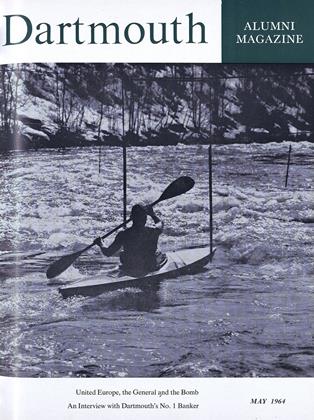WILLIAM SHAKESPEARE intended his plays to be performed on the stage, since any drama must be produced in order to come to life. In Professor John Finch's section of English II, twenty freshmen devoted the winter term to a study of Othello, and concluded the course by putting on the first act of the play. The work in the classroom involved studying the text of the play, investigating its stage history, and reading the critical literature on it. This provided a solid background for the students' understanding of Othello, but it was not until they moved onto the stage that the play was fulfilled.
Professor Finch analyzed the development and the intricacies of the play. The director of the production, Prof. Ward Williamson, discussed the physical aspects of the Elizabethan theatre and described the use of scenery and costumes in Shakespeare's time. With the classroom study completed, the students auditioned and were cast in their roles. Everyone had a hand in the production, some as actors, others assisting with such things as lights, sound, set, or costumes. The play began to take shape in the scenery storage room of the Hopkins Center as the students learned and interpreted their roles under the guidance of director Williamson.
Three performances of Othello, Act I, were presented in the Studio Theater of the Hopkins Center on Friday, March 13, and twice on Saturday evening, March 14. Full houses helped to bring out the best in the student-actors. Iago, the devious ensign, was portrayed by Craig Ordway. Andrew Barrie was the noble Othello, and Ann Sachs, a Hanover High School student, played the attractive Desdemona.
The set for the play consisted of a simple arrangement of four platforms. The lighting and the music were skilfully blended so as to create a mood for the action. As for the costumes, the major characters wore shirts that evoked the Elizabethan period, the senators dressed in flowing robes, and the attendants and soldiers wore turtlenecks. The performance was a class exercise, not a full-scale production which would have necessitated elaborate scenery and costumes.
From its beginnings the Hopkins Center has been thought of as an instrument of instruction. Such a venture as the Freshman Othello is a step toward realizing that aim, a step from theory to practice, from the classroom to the stage.
Freshmen, with Desdemona, in their Hopkins Center production of "Othello."
 View Full Issue
View Full Issue
More From This Issue
-
 Feature
FeatureUNITED EUROPE, THE GENERAL AND THE BOMB
May 1964 By HENRY W. EHRMANN, -
 Feature
FeatureDARTMOUTH'S NO. 1 BANKER
May 1964 By DERO A. SAUNDERS '35, -
 Feature
FeatureA New Strategy of Liberal Learning
May 1964 -
 Article
ArticleTHE UNDERGRADUATE CHAIR
May 1964 By DAVE BOLDT '63 -
 Class Notes
Class Notes1936
May 1964 By BARRY C. SULLIVAN, GILBERT BALKAM -
 Class Notes
Class Notes1922
May 1964 By LEONARD E. MORRISSEY, CARTER H. HOYT
A. DAVID MANGELSDORFF '67
Article
-
 Article
ArticleMasthead
June 1937 -
 Article
ArticleFaculty Articles
JULY 1964 -
 Article
ArticleSweat-Free Gym
December 1994 By Brad Parks '96 -
 Article
ArticleWith the D. O. C.
December 1938 By J. W. Brown '37. -
 Article
ArticleNotebook
July/Aug 2003 By THOMAS AMES JR. '74 -
 Article
ArticleSTUDENT ACTIVITIES PARADOXICAL
February 1937 By William B. Rotch ’37


